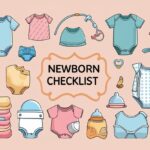Discovering you’re pregnant can be both exciting and overwhelming. As you begin this journey, understanding the changes in your body and the development of your baby is crucial.

During this period, you may experience various physical and emotional changes. Knowing what to expect can help you navigate this critical phase with confidence. A comprehensive guide to the first trimester will walk you through the essential milestones and preparations.
This guide is designed to provide you with a clear understanding of the key developments during the initial stages of your pregnancy. By being informed, you can better prepare yourself for the journey ahead.
The Beginning of Your Pregnancy Journey
The moment you discover you’re pregnant, a mix of emotions and questions flood your mind. Understanding the initial stages of pregnancy can help you navigate this life-changing experience with confidence.
Confirming Your Pregnancy
Confirming your pregnancy typically starts with a home pregnancy test (HPT), which detects the presence of human chorionic gonadotropin (hCG) in your urine. For more accurate results, it’s recommended to take the test after missing a period. If the test is positive, schedule an appointment with your healthcare provider for a blood test and ultrasound to confirm the pregnancy.
Calculating Your Due Date
Calculating your due date is a crucial step in understanding your pregnancy timeline. Your healthcare provider will typically determine your due date based on the first day of your last menstrual period (LMP) or through an ultrasound. Understanding your due date helps you prepare for the arrival of your baby and track your pregnancy week by week (1–12 weeks).

Physical and Emotional Reactions to Pregnancy News
Upon learning you’re pregnant, you may experience a range of physical and emotional reactions. Common symptoms in early pregnancy include morning sickness, fatigue, and mood swings. Morning sickness in the first trimester is particularly prevalent, affecting many women to varying degrees. Emotionally, you might feel a mix of excitement, anxiety, and anticipation as you begin this new journey.
As you progress through the early stages of pregnancy, it’s essential to be aware of your body’s changes and how they relate to your overall health and well-being. By understanding what to expect, you can better manage your symptoms and prepare for the months ahead.
What to Expect in the First Trimester of Pregnancy
The first trimester is crucial for fetal development and brings about various physical and emotional changes for the mother. Understanding these changes can help you better navigate this period.
Timeline of Major Changes
During the first trimester, significant developmental milestones occur. By the end of week 4, the embryo’s heart begins to beat, and by week 8, major organs start to develop. By week 12, the fetus is fully formed, with the foundation for all major systems laid.
Key developmental stages include:
- Weeks 1-4: Conception and implantation
- Weeks 5-8: Organogenesis and basic structural development
- Weeks 9-12: Continued growth and refinement of features
Common Physical Transformations
Physically, the first trimester can bring about a range of changes. Some common symptoms include morning sickness, fatigue, and breast tenderness. These changes are largely due to hormonal shifts and the body’s adjustment to pregnancy.
| Symptom | Cause | Management Tip |
|---|---|---|
| Morning Sickness | Hormonal Changes | Eat small, frequent meals |
| Fatigue | Increased Progesterone Levels | Rest when needed |
| Breast Tenderness | Hormonal Fluctuations | Wear a supportive bra |
Emotional Shifts and Mood Changes
Emotionally, the first trimester can be a rollercoaster. Hormonal changes, combined with the excitement and sometimes anxiety of pregnancy, can lead to mood swings. It’s essential to acknowledge these feelings and seek support when needed.

By understanding what to expect during the first trimester, you can better prepare yourself for the journey ahead. This period is not just about fetal development; it’s also about the changes you’ll experience as a mother.
Early Pregnancy Symptoms: Signs Your Body is Changing
As you start your pregnancy journey, you may experience a range of early pregnancy symptoms that signal the changes happening in your body. These symptoms can vary widely from one woman to another, but there are some common signs that many women experience during the first trimester.
Most Common First Trimester Symptoms
The first trimester is a period of significant change, and it’s common to experience symptoms such as morning sickness, fatigue, and mood swings. Morning sickness in the first trimester is one of the most well-known symptoms, although it can occur at any time of day. Other common symptoms include:
- Bloating and cramping
- Breast tenderness
- Frequent urination
- Food cravings or aversions

When Symptoms Typically Begin and End
Most women start experiencing common symptoms in early pregnancy around the 4th to 6th week. Symptoms like morning sickness often peak around the 9th to 10th week and may subside by the 12th to 14th week. However, the duration and intensity of these symptoms can vary significantly from one woman to another.
Distinguishing Normal from Concerning Symptoms
While many early pregnancy symptoms are normal, it’s crucial to distinguish them from symptoms that may indicate a concern. Severe morning sickness that leads to dehydration, severe abdominal pain, or vaginal bleeding are symptoms that require immediate medical attention. Understanding what’s normal and what’s not can help you navigate your pregnancy with confidence.
By being aware of the common symptoms and knowing when to seek medical help, you can better manage your health during the first trimester. If you’re experiencing any concerning symptoms, don’t hesitate to reach out to your healthcare provider.
Pregnancy Week by Week: First Trimester Development
Pregnancy is a remarkable journey, with the first trimester being a critical period of development. During these initial 12 weeks, your baby undergoes significant transformations, from conception through implantation, organ development, and finally, the transition from embryo to fetus.
Weeks 1-4: Conception and Implantation
The journey begins with conception, where a sperm fertilizes an egg, forming a zygote. Over the next few weeks, this zygote develops into a blastocyst, which then implants itself into the uterine lining. By the end of Week 4, the foundation for major organs and body systems is laid.
Weeks 5-8: Essential Organ Development
During Weeks 5-8, the embryo’s major organs begin to develop. The heart starts to beat, and the foundations for the lungs, liver, and pancreas are formed. The neural tube, which will become the brain and spinal cord, also develops during this period.
Weeks 9-12: From Embryo to Fetus
By Week 9, the embryo is now referred to as a fetus, marking a significant milestone. The fetus continues to grow and develop, with major advancements in organ function and physical appearance.
Major Developmental Milestones
Some key milestones during this period include the formation of fingers and toes, the development of facial features, and the beginning of digestive system function.
Size and Weight Progression
The fetus grows from a tiny zygote to approximately 2.5 inches in length and weighs about 0.25 pounds by the end of Week 12.
| Week | Major Developments | Size |
|---|---|---|
| 1-4 | Conception, implantation, initial organ formation | Microscopic |
| 5-8 | Major organ development, heartbeat | About 1 inch |
| 9-12 | Transition from embryo to fetus, limb formation | About 2.5 inches |
Understanding these developmental milestones can help expectant parents appreciate the incredible journey their baby is on during the first trimester.
First Trimester Checklist: Essential Steps for New Parents
Understanding what to expect and prepare for during the first trimester can significantly reduce anxiety for new parents. This critical period is filled with numerous changes and decisions that will impact the rest of the pregnancy journey.
Healthcare Appointments to Schedule
One of the first steps is to schedule healthcare appointments. This includes:
- Confirming the pregnancy with a healthcare provider
- Scheduling the first prenatal visit, typically between weeks 6 to 8
- Discussing any concerns or risk factors with your healthcare provider
The first prenatal visit is crucial as it sets the stage for the pregnancy care plan. Expect discussions about medical history, lifestyle, and initial screenings.
Important Lifestyle Adjustments
Making healthy lifestyle choices is vital during the first trimester. This includes:
- Adopting a balanced diet rich in essential nutrients
- Avoiding harmful substances like alcohol and tobacco
- Engaging in safe physical activities
Financial and Insurance Considerations
It’s also important to consider the financial aspects of having a baby. This involves:
- Reviewing insurance coverage for prenatal care and delivery
- Creating a budget for baby expenses
- Exploring available financial assistance programs if needed
| Insurance Coverage | Typical Expenses | Financial Assistance |
|---|---|---|
| Prenatal care, delivery, postpartum care | Baby supplies, medical bills | Government programs, non-profit organizations |
| Review policy details for coverage | Plan for immediate and ongoing expenses | Research local and national resources |
Preparing Your Home and Workplace
Preparing your home and workplace for the new addition involves:
- Setting up a nursery or baby area
- Discussing maternity or paternity leave with your employer
- Adjusting your work environment if necessary
By following this checklist, expectant parents can feel more prepared and in control as they navigate the first trimester.
Nutrition and Wellness in Early Pregnancy
The first trimester is a critical period of fetal development, and maintaining a healthy lifestyle through proper nutrition and wellness can significantly impact your pregnancy. A well-balanced diet rich in essential nutrients supports the growth and development of your baby.
Essential Nutrients for Fetal Development
During the first trimester, certain nutrients are crucial for your baby’s development. These include:
- Folic Acid: Prevents birth defects of the baby’s brain and spine.
- Iron: Supports the production of red blood cells for both you and your baby.
- Calcium: Essential for the development of your baby’s bones, teeth, and muscles.
- Protein: Vital for the growth and development of your baby’s tissues.
| Nutrient | Importance | Food Sources |
|---|---|---|
| Folic Acid | Prevents birth defects | Leafy greens, citrus fruits, fortified cereals |
| Iron | Supports red blood cell production | Red meat, poultry, fish, beans, lentils |
| Calcium | Develops bones, teeth, and muscles | Dairy products, leafy greens, fortified plant-based milk |
Managing Morning Sickness and Food Aversions
Morning sickness is a common symptom in early pregnancy. To manage it, try eating small, frequent meals, avoiding strong-smelling foods, and staying hydrated.
Safe Exercise During the First Trimester
Engaging in safe physical activities during the first trimester can help alleviate symptoms and support overall health. Recommended exercises include brisk walking, swimming, and prenatal yoga.
Sleep Strategies for Pregnancy Discomfort
As your body changes, finding comfortable sleep positions becomes challenging. Try sleeping on your side with a pillow between your knees to alleviate discomfort and support your back.
By focusing on nutrition and wellness, you can create a healthy environment for your baby to grow and develop during the critical first trimester.
First Prenatal Visit: What to Expect
Understanding what to expect during your first prenatal visit can help alleviate any anxiety and prepare you for the journey ahead. This initial visit is a crucial step in your pregnancy care, setting the stage for a healthy pregnancy.
Medical Tests and Screenings
During your first prenatal visit, your healthcare provider will perform several medical tests and screenings. These may include:
- Blood tests to check for blood type, Rh factor, and infections
- Urine tests to screen for urinary tract infections and kidney problems
- A physical exam to assess your overall health and any potential issues
- An ultrasound to confirm your due date and check on the baby’s development
Questions to Ask Your Healthcare Provider
It’s essential to come prepared with questions for your healthcare provider. Consider asking about:
- Your due date and the baby’s development
- Diet and nutrition recommendations
- Safe exercises during pregnancy
- Any concerns or symptoms you’re experiencing
Building Your Medical Support Team
Your first prenatal visit is also an opportunity to start building your medical support team. This includes:
- Your primary obstetrician or healthcare provider
- Specialists such as perinatologists if needed
- Nurses and other support staff at your healthcare provider’s office
Having a strong support team can make a significant difference in your pregnancy experience.
Understanding Prenatal Genetic Testing Options
Prenatal genetic testing can provide valuable insights into your baby’s health. Discuss with your healthcare provider the available options, including:
- Non-invasive prenatal testing (NIPT)
- Chorionic villus sampling (CVS)
- Amniocentesis
Understanding these tests can help you make informed decisions about your pregnancy care.
First Trimester Do’s and Don’ts
As you embark on your pregnancy journey, knowing the do’s and don’ts of the first trimester can help you stay healthy and informed. This period is crucial for your baby’s development, and being aware of the necessary precautions and recommendations can make a significant difference.
Foods and Activities to Avoid
During the first trimester, it’s essential to avoid certain foods and activities that could pose risks to your pregnancy. Raw or undercooked foods, high-mercury fish, and unpasteurized dairy products should be avoided to minimize the risk of foodborne illnesses.
- Avoid raw or undercooked meat, eggs, and fish.
- Limit consumption of high-mercury fish like shark, swordfish, and king mackerel.
- Steer clear of unpasteurized dairy products and juices.
Additionally, certain activities should be avoided or approached with caution. For instance, contact sports, scuba diving, and hot tubs can pose significant risks.
Recommended Habits for a Healthy Pregnancy
Adopting healthy habits during the first trimester can significantly contribute to a successful pregnancy. Eating a balanced diet rich in essential nutrients is crucial.
| Nutrient | Benefit | Food Sources |
|---|---|---|
| Folic Acid | Prevents birth defects of the brain and spine | Leafy greens, citrus fruits, fortified cereals |
| Iron | Supports the production of red blood cells | Red meat, poultry, fish, beans, lentils |
| Calcium | Essential for fetal bone development | Dairy products, leafy greens, fortified plant-based milk |
Medications and Supplements Safety
It’s crucial to consult your healthcare provider before taking any medications or supplements during the first trimester. Certain over-the-counter drugs and herbal supplements can be harmful.
Managing Work and Travel During Early Pregnancy
For many women, the first trimester is a time when work and travel continue as usual. However, it’s essential to listen to your body and make necessary adjustments. If you’re experiencing severe morning sickness or fatigue, consider discussing flexible work arrangements with your employer.
By being informed and making conscious choices, you can navigate the first trimester with confidence, setting the stage for a healthy pregnancy.
Conclusion: Navigating Your First Trimester Successfully
Understanding what to expect during the first trimester is crucial for a healthy pregnancy. This first trimester pregnancy guide has provided you with essential information on the physical and emotional changes you may experience, as well as the critical steps to take for a successful pregnancy journey.
As you navigate this period, remember that every woman’s experience is unique. Being aware of what happens in the first trimester allows you to better prepare for the changes ahead and make informed decisions about your care.
By following the guidelines outlined in this article, you can ensure a smooth transition into your pregnancy. Stay informed, prioritize your health, and don’t hesitate to reach out to your healthcare provider with any questions or concerns.
FAQ
What are the most common early pregnancy symptoms?
Common early pregnancy symptoms include morning sickness, fatigue, breast tenderness, and frequent urination. These symptoms can vary from woman to woman and may not be the same for every pregnancy.
How soon can I take a pregnancy test after conception?
You can take a pregnancy test as early as 7-10 days after conception, but it’s recommended to wait until after your missed period for more accurate results.
What happens during the first prenatal visit?
During the first prenatal visit, your healthcare provider will perform a physical exam, take a medical history, and discuss your pregnancy, including any concerns or risk factors. You may also undergo initial blood work and other screenings.
How is my due date calculated?
Your due date is typically calculated based on the first day of your last menstrual period (LMP) or through an ultrasound. Most pregnancies last around 40 weeks from the start of your LMP.
What are some essential nutrients for fetal development during the first trimester?
Essential nutrients for fetal development include folic acid, iron, calcium, and protein. A well-balanced diet rich in whole foods, fruits, and vegetables is crucial.
Can I exercise during the first trimester?
Yes, exercise is generally safe during the first trimester, but it’s recommended to consult with your healthcare provider before starting or continuing any exercise routine. Avoid high-impact activities and listen to your body.
How can I manage morning sickness?
To manage morning sickness, try eating small, frequent meals, avoiding strong-smelling foods, and staying hydrated. Ginger and vitamin B6 supplements may also help alleviate symptoms.
What are some common concerns during the first trimester, and when should I seek medical attention?
Common concerns include severe morning sickness, vaginal bleeding, and severe abdominal pain. If you experience any of these symptoms, contact your healthcare provider for guidance.
What lifestyle adjustments should I make during the first trimester?
Recommended lifestyle adjustments include quitting smoking, avoiding alcohol, limiting caffeine, and maintaining a healthy diet. It’s also essential to manage stress and get enough rest.
What are the key developmental milestones during the first trimester?
Key developmental milestones include implantation (weeks 1-2), organ development (weeks 3-8), and the transition from embryo to fetus (weeks 9-12). Your healthcare provider will monitor these milestones during prenatal visits.
How to Balance Work and Parenting Without Burnout – Theparentzy.com
Top 7 Mistakes New Parents Make (And How to Avoid Them) – Theparentzy.com
thank you.





Pingback: How to Prepare for Your Baby’s Arrival: Checklist for New Parents - Theparentzy.com
Pingback: Postpartum Depression - Theparentzy.com